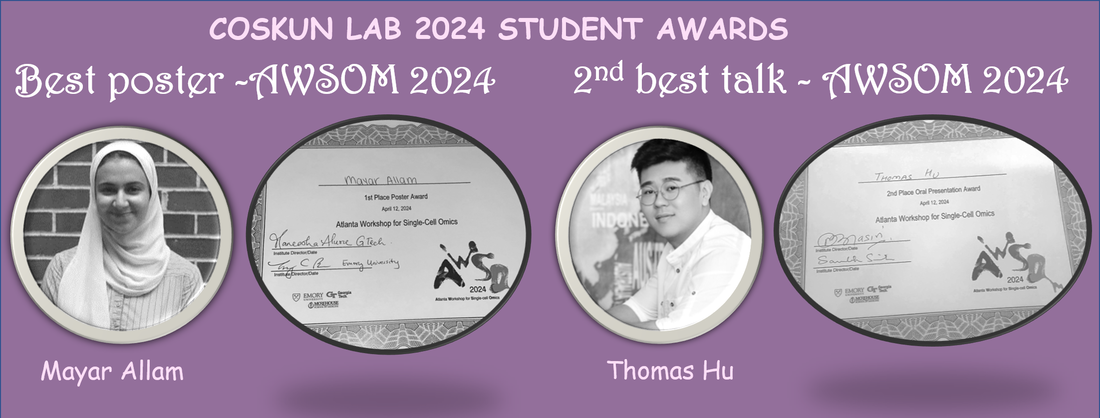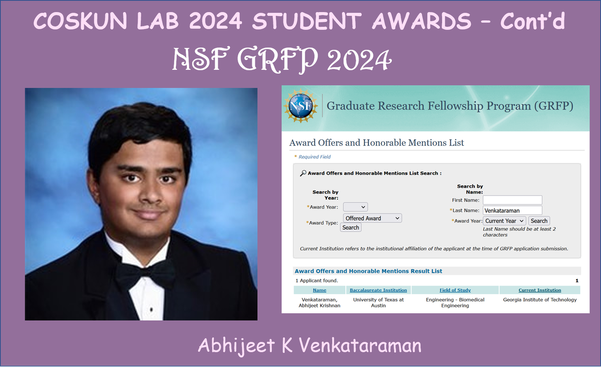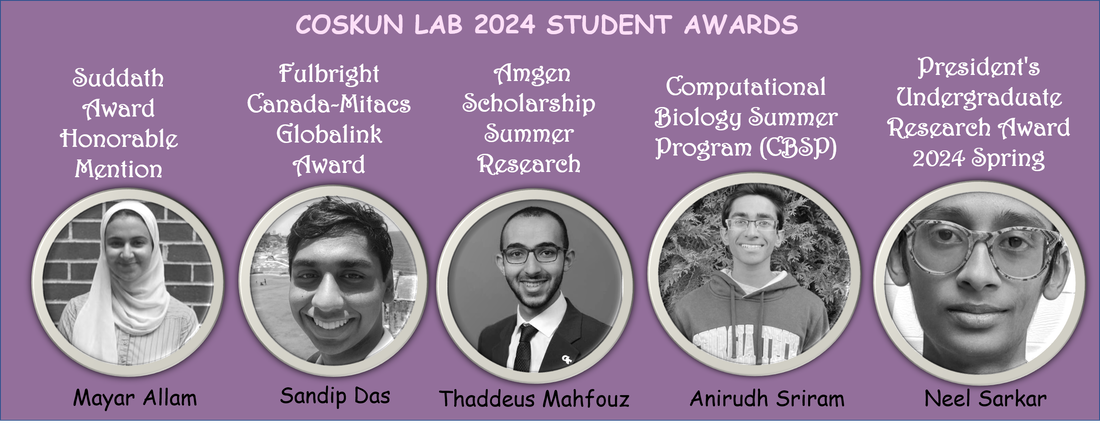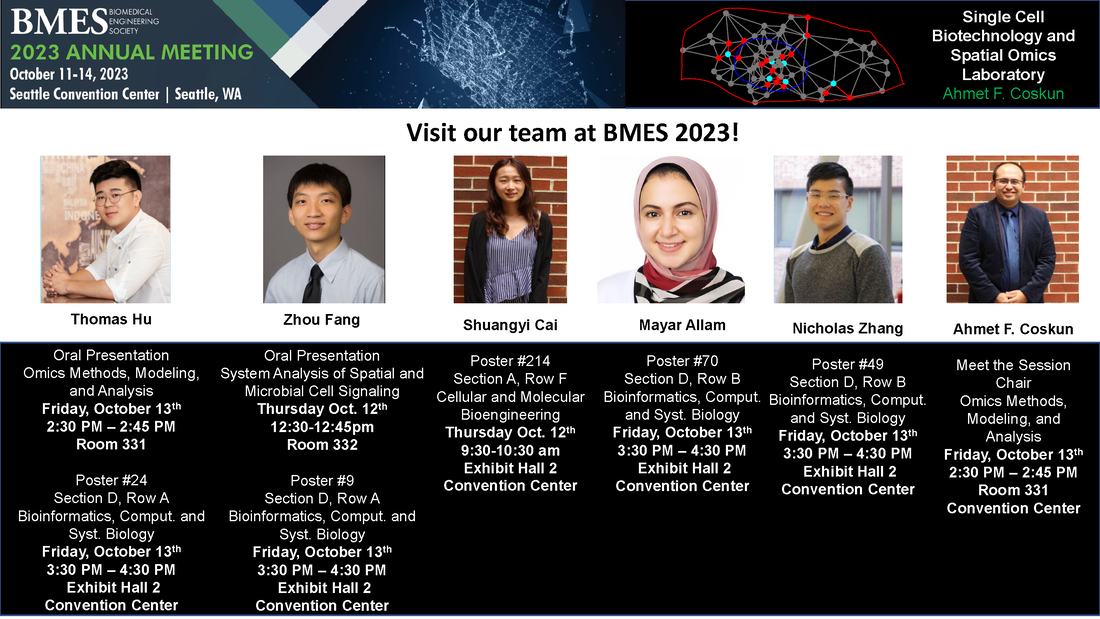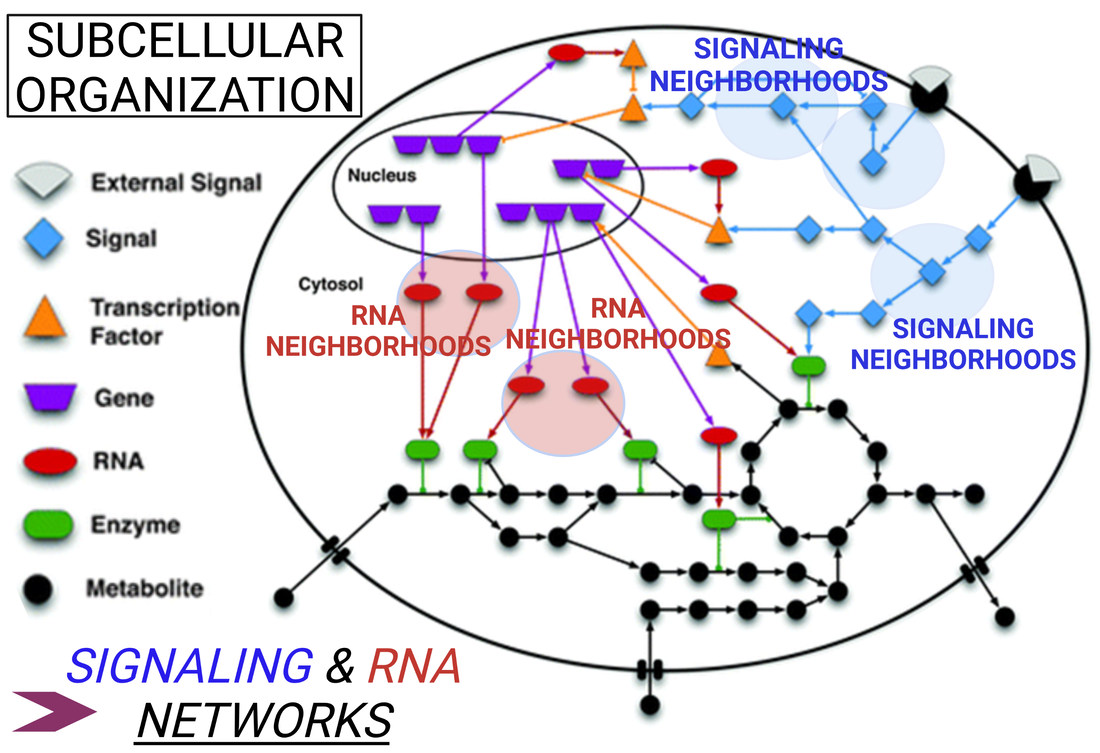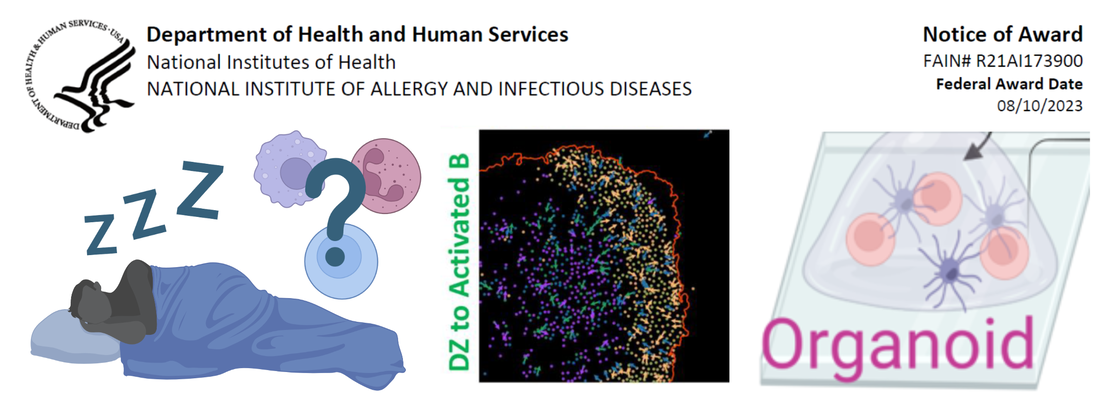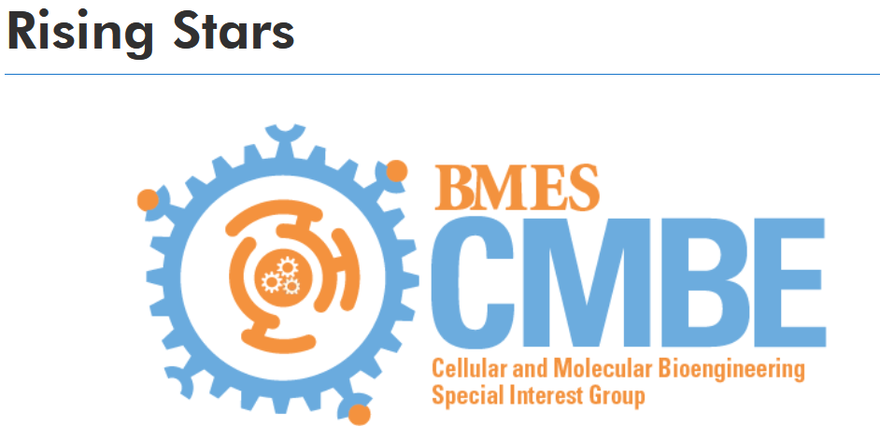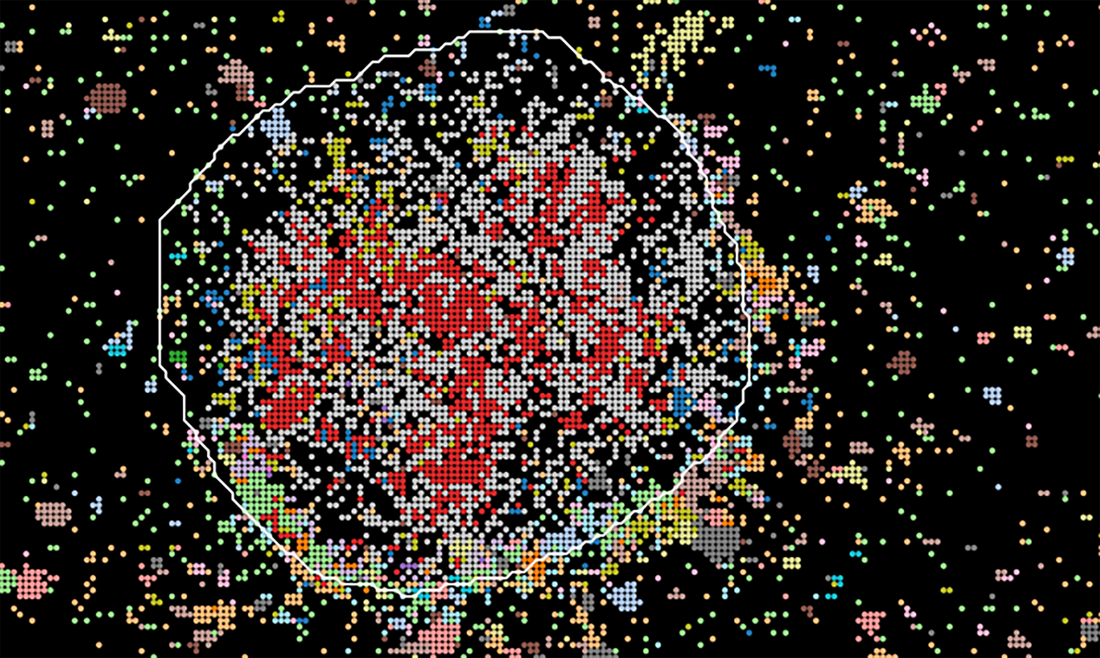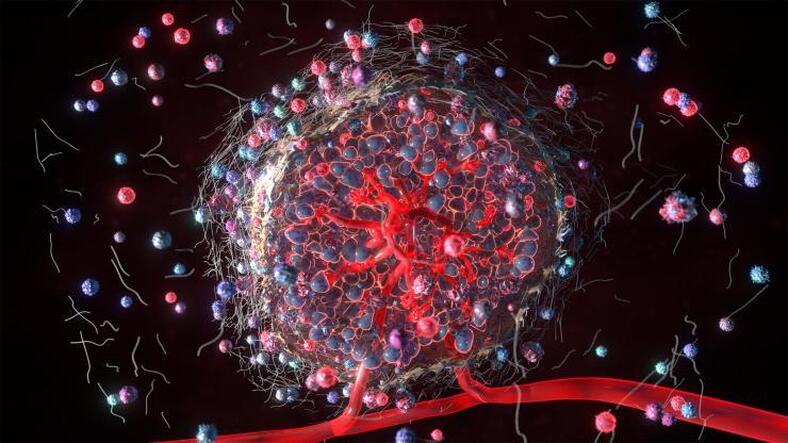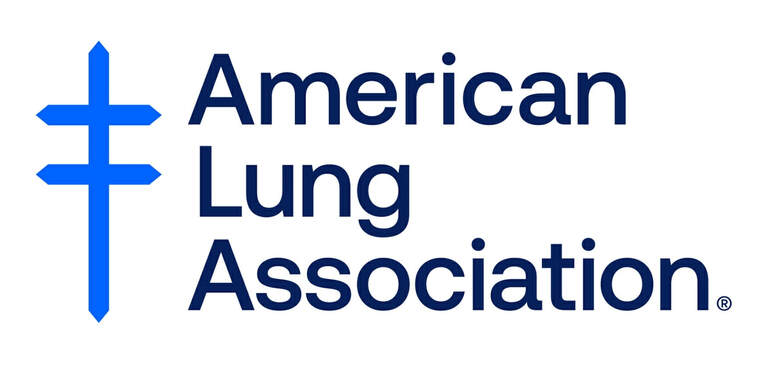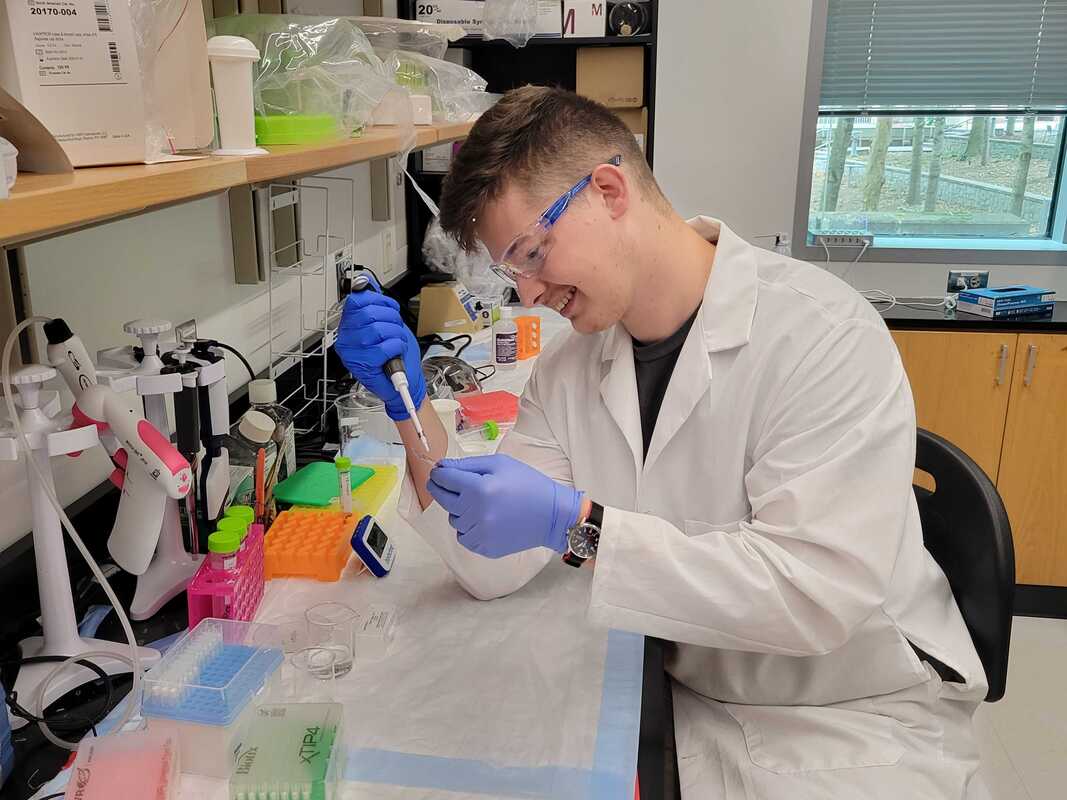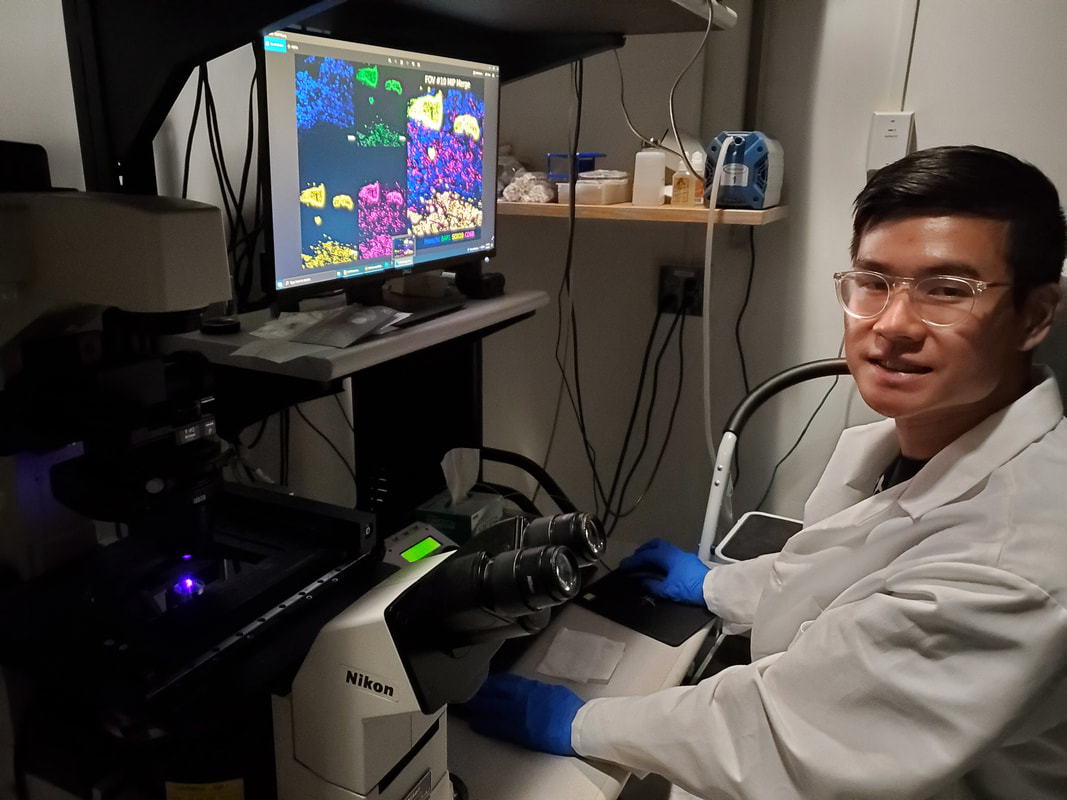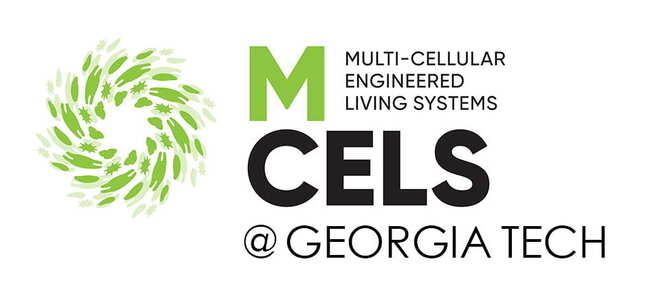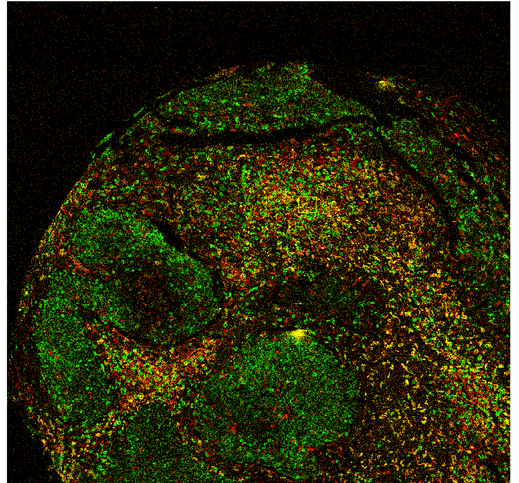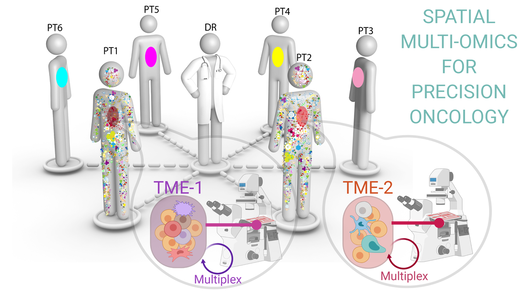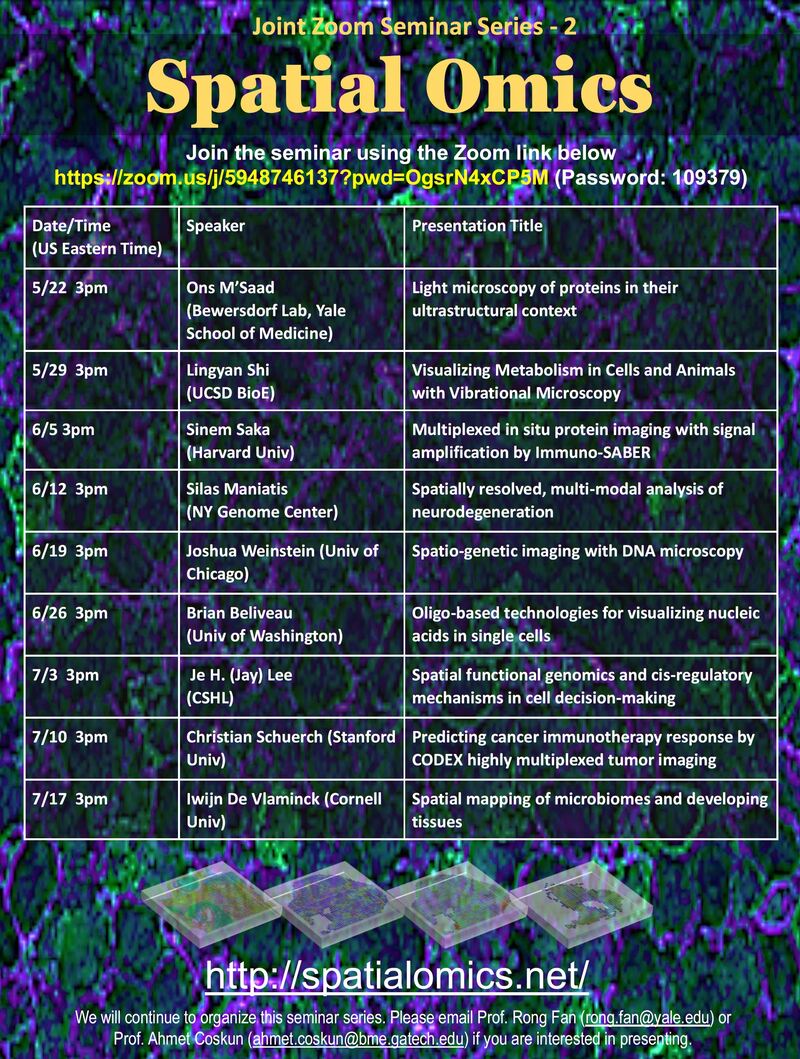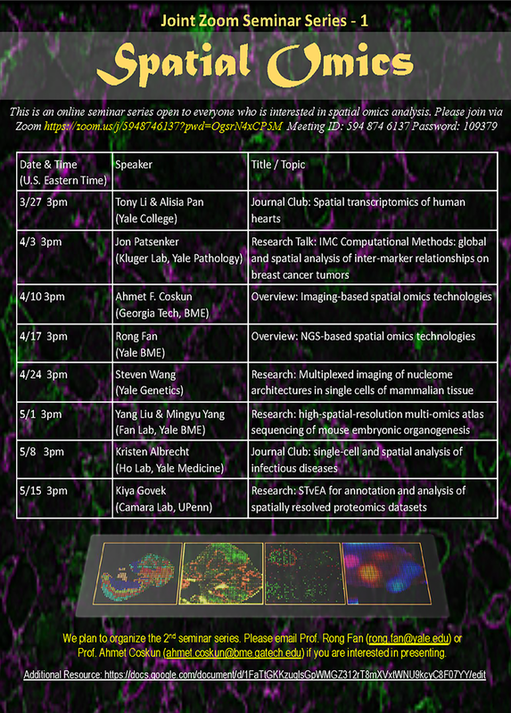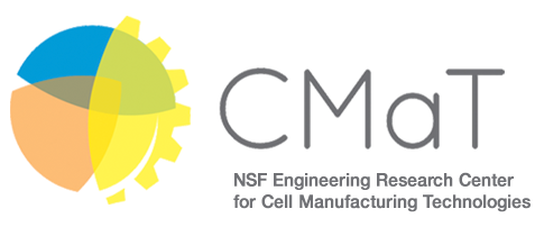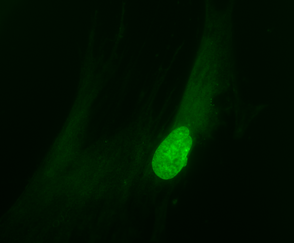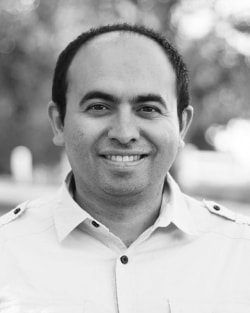|
STUDENT AWARDS |
[4/2024] Coskun Lab graduate researchers received AWSOM Single Cell AI Awards
Student Success Alert!
Congrats to our PhD students for winnings awards at the Single Cell AI symposium at Georgia Tech today.
Mayar Allam for best poster award on single cell immune networks
Thomas Hu for second best talk on graph based spatial morphoproteomics for covid prediction in tissues
Congrats to our PhD students for winnings awards at the Single Cell AI symposium at Georgia Tech today.
Mayar Allam for best poster award on single cell immune networks
Thomas Hu for second best talk on graph based spatial morphoproteomics for covid prediction in tissues
|
STUDENT AWARDS |
[4/2024] Coskun Lab graduate researcher received an NSF fellowship for his aging on chip research
Student Success Alert!
Congratulations to our PhD student Abhijeet Venkataraman for receiving the National Science Foundation (NSF) Graduate Research Fellowship Program (GRFP) Award! Abhijeet will impact the field by shedding light on spatially resolved aging biology on a chip!
Looking forward to his discoveries and we are excited to work together with him in our team...
Congratulations to our PhD student Abhijeet Venkataraman for receiving the National Science Foundation (NSF) Graduate Research Fellowship Program (GRFP) Award! Abhijeet will impact the field by shedding light on spatially resolved aging biology on a chip!
Looking forward to his discoveries and we are excited to work together with him in our team...
|
STUDENT AWARDS |
[3/2024] Coskun Lab undergraduate and graduate researchers received multiple awards
Student Success Alert!
Innovation is driven by our hardworking, smart, and dedicated students.
Happy to announce our students' award received this semester in our lab!
Congratulations to:
Mayar Allam for Suddath Award Honorable Mention
Sandip Das for Fullbright Canada-Mitacs Globalink Award
Thaddeus M. for Amgen Scholarship Summer Research at Columbia
Anirudh Sriram for the Memorial Sloan Kettering Computational Biology Summer Program (CBSP)
Neel Sarkar for the President's Undergraduate Research Awards, Spring 2024
Innovation is driven by our hardworking, smart, and dedicated students.
Happy to announce our students' award received this semester in our lab!
Congratulations to:
Mayar Allam for Suddath Award Honorable Mention
Sandip Das for Fullbright Canada-Mitacs Globalink Award
Thaddeus M. for Amgen Scholarship Summer Research at Columbia
Anirudh Sriram for the Memorial Sloan Kettering Computational Biology Summer Program (CBSP)
Neel Sarkar for the President's Undergraduate Research Awards, Spring 2024
|
TEACHING AWARD |
[2/2024] Prof Coskun received the Student Recognition of Excellence in Teaching: CIOS Award
This award is open to full-time Georgia Tech employees who teach credit courses and who administer the Course Instructor Opinion Survey (CIOS). Depending on the level of funding available each year, 40 to 50 winners will be selected and announced each January for courses taught during the previous calendar year. Each award winner will receive a $1000 stipend.
For more information
For more information
|
TEAM VISIBILITY |
[12/2023] Coskun Lab Pioneering New Field of Research: Single Cell Spatial Metabolomics
Ahmet Coskun and his collaborators plan to create a chemical atlas of all the immune cells in the human body, a 3D micromap to help clinicians navigate the complex role of the entire immune system in the presence of different diseases.
It’s the kind of massive undertaking that would result in vastly improved precision therapies for patients. And it’s the kind of journey that starts with a single cell. Coskun and team are off to a fast start with the introduction of a new integrative technique for profiling human tissue that enables researchers to capture the geography, structure, movement, and function of molecules in a 3D picture.
The researchers described their new approach, the Single Cell Spatially resolved Metabolic (scSpaMet) framework, in the journal Nature Communications on Dec. 13. The study builds on a technique Coskun’s team developed and described in a 2021 article, “3D Spatially resolved Metabolomic profiling Framework,” published in Science Advances. In that work, the team introduced a technique that measures the activity of metabolites and proteins as part of a comprehensive profile of human tissue samples.
For more information
It’s the kind of massive undertaking that would result in vastly improved precision therapies for patients. And it’s the kind of journey that starts with a single cell. Coskun and team are off to a fast start with the introduction of a new integrative technique for profiling human tissue that enables researchers to capture the geography, structure, movement, and function of molecules in a 3D picture.
The researchers described their new approach, the Single Cell Spatially resolved Metabolic (scSpaMet) framework, in the journal Nature Communications on Dec. 13. The study builds on a technique Coskun’s team developed and described in a 2021 article, “3D Spatially resolved Metabolomic profiling Framework,” published in Science Advances. In that work, the team introduced a technique that measures the activity of metabolites and proteins as part of a comprehensive profile of human tissue samples.
For more information
|
TEAM VISIBILITY |
[10/2023] Coskun Lab Presented 2 Talks and 5 Posters in BMES
Please meet our lab members at BMES 2023! Here are their oral talks (2x) and posters (5x). Excited to share our perspective and progress in single cell spatial omics!
For more information
For more information
|
FUNDING |
[10/2023] Coskun Receives $1.86 Million NIH MIRA Award to Map Spatial Molecular Neighborhoods
Ahmet Coskun has a saying on the homepage of his lab’s website: “Seeing is believing. Quantifying is proving.” So, with that in mind, Coskun and his team have developed multiplex imaging tools and combined them with machine learning techniques – for believing and quantifying. Now, to support Coskun’s research, the National Institutes of Health has granted him the prestigious Maximizing Investigator’s Research Award (MIRA) from the National Institute of General Medical Sciences. Coskun and his team will use the five-year, $1.86 million award for a project entitled, “Dissecting subcellular and cellular organization by spatial molecular neighborhood networks.” For Coskun, the MIRA is the next phase of support in a flurry of awards that have come his way recently: it’s the fifth NIH grant his lab has received this year, with a total value of $3.6 million.
For more information
For more information
|
FUNDING |
[9/2023] Our lab received a R35 MIRA grant from National Institute of Health NIGMS to model subcellur and molecular neighborhoods in single cells
Maximizing Investigators' Research Award (MIRA) (R35) provides support for research in an investigator's laboratory that falls within the mission of NIGMS. The goal of MIRA is to increase the efficiency of NIGMS funding by providing investigators with greater stability and flexibility, thereby enhancing scientific productivity and the chances for important breakthroughs. The program will also help distribute funding more widely among the nation's highly talented and promising investigators. MIRA grants will generally be for 5 years.
For more information
For more information
|
FUNDING |
[9/2023] Our lab received another NIH R21 grant from National Institute of Health NIDCR to evaluate mesenchymal stromal cells (MSCs) and T cells in salivary gland disorders
The NIH Exploratory/Developmental Grant supports exploratory and developmental research projects by providing support for the early and conceptual stages of these projects. These studies may involve considerable risk but may lead to a breakthrough in a particular area, or to the development of novel techniques, agents, methodologies, models, or applications that could have a major impact on a field of biomedical, behavioral, or clinical research.
For more information
For more information
|
FUNDING |
[8/2023] Our lab received a larger NIH R21 grant from National Institute of Health Office of Director (OD) to model spatial organization of germinal centers in nonhuman primates
The NIH Exploratory/Developmental Grant supports exploratory and developmental research projects by providing support for the early and conceptual stages of these projects. These studies may involve considerable risk but may lead to a breakthrough in a particular area, or to the development of novel techniques, agents, methodologies, models, or applications that could have a major impact on a field of biomedical, behavioral, or clinical research.
For more information
For more information
|
FUNDING |
[8/2023] Our lab received a NIH R21 grant from National Institute of Allergy and Infectious Diseases (NIAID) to study sleep immunity using tonsil tissues and immune organoids
The NIH Exploratory/Developmental Grant supports exploratory and developmental research projects by providing support for the early and conceptual stages of these projects. These studies may involve considerable risk but may lead to a breakthrough in a particular area, or to the development of novel techniques, agents, methodologies, models, or applications that could have a major impact on a field of biomedical, behavioral, or clinical research.
For more information
For more information
|
RESEARCH |
[5/2023] A Look Inside Stem Cells Helps Create Personalized Regenerative Medicine
In two papers out of the lab of Ahmet F. Coskun, a Bernie Marcus Early Career professor in the Coulter Department of Biomedical Engineering at the Georgia Institute of Technology and Emory University, researchers examined a specific type of stem cell with an intracellular toolkit to determine which cells are most likely to create effective cell therapies. “We are expanding the toolkit for the subcellular spatial organization of molecules – a ‘Swiss Army Knife’ for the subcellular spatial omics field, if you will,” said Coskun. “The goal is to measure, quantify, and model multiple independent but also interrelated molecular events in each cell with multiple functionalities. The end purpose is to define a cell’s function that can achieve high energy, Lego-like modular gene neighborhood networks and diverse cellular decisions.”
For more information
Similar stories:
For more information
Similar stories:
- The Inner Workings of Stem Cells: A Game-Changer for Personalized Medicine
- Using an intracellular toolkit to map organelle bio-geography in stem cells
- Researchers map RNA to inform selection of stem cells for therapeutic applications
- A look inside stem cells helps create personalized regenerative medicine
|
FUNDING |
[5/2023] Our lab received a NIH R21 grant from National Institute on Aging to study tissue systems biology of immune aging
The NIH Exploratory/Developmental Grant supports exploratory and developmental research projects by providing support for the early and conceptual stages of these projects. These studies may involve considerable risk but may lead to a breakthrough in a particular area, or to the development of novel techniques, agents, methodologies, models, or applications that could have a major impact on a field of biomedical, behavioral, or clinical research.
For more information
For more information
|
TEACHING AWARD |
[2/2023] Prof Coskun received the Student Recognition of
Student Recognition of Excellence in Teaching: Annual CIOS Award
This award is open to full-time Georgia Tech employees who teach credit courses and who administer the Course Instructor Opinion Survey (CIOS). Depending on the level of funding available each year, 40 to 50 winners will be selected and announced each January for courses taught during the previous calendar year. Each award winner will receive a $1000 stipend.
For more information
For more information
|
AWARD |
[11/2022] Dr Coskun received a 2023 BMES-CMBE Rising Star Junior Faculty Award
The BMES Cellular and Molecular Bioengineering Special Interest Group brings together researchers with diverse scientific and clinical interests with a common goal of understanding and engineering molecules, cells, their interactions, and microenvironments in the pursuit of controlling biological processes and improving the practice of medicine. To maintain its multidisciplinary character and central research focus, the CMBE SIG is committed to supporting new investigators within the field. Towards this goal, the “Rising Star” award has been given to a select group of exceptional junior principal investigators each year. Awardees provide a podium presentation in a special session at the annual conference.
For more information: https://www.bmes.org/rising-stars
For more information: https://www.bmes.org/rising-stars
|
RESEARCH |
[10/2022] Coskun Lab Zooming in on the Signals of Cancer
Improving Precision Oncology Using Multiplexed Bioimages and Artificial Intelligence
This year, about 240,000 people in the U.S. will discover they have lung cancer. Some 200,000 of them will be diagnosed with non-small-cell lung cancer, which is the second leading cause of death after cardiovascular disease.
Georgia Tech researcher Ahmet Coskun is working to improve the odds for these patients in two recently published studies that are essentially focused on understanding why and how patients respond differently to disease and treatments.
“What we have learned is connectivity and communication between molecules and between cells is what really controls everything, regarding whether or not patients get healthy, or how they will respond to drugs,” said Coskun, an assistant professor in the Wallace H. Coulter Department of Biomedical Engineering at Georgia Tech and Emory University.
Published in the journals npj Precision Oncology and iScience, the studies detail the development of tools and techniques to deeply explore the tumor microenvironment at the subcellular level, utilizing the Coskun lab’s expertise in combining multiplex cellular imaging methods with artificial intelligence.
For more information: https://research.gatech.edu/coskun-lab-zooming-signals-cancer
This year, about 240,000 people in the U.S. will discover they have lung cancer. Some 200,000 of them will be diagnosed with non-small-cell lung cancer, which is the second leading cause of death after cardiovascular disease.
Georgia Tech researcher Ahmet Coskun is working to improve the odds for these patients in two recently published studies that are essentially focused on understanding why and how patients respond differently to disease and treatments.
“What we have learned is connectivity and communication between molecules and between cells is what really controls everything, regarding whether or not patients get healthy, or how they will respond to drugs,” said Coskun, an assistant professor in the Wallace H. Coulter Department of Biomedical Engineering at Georgia Tech and Emory University.
Published in the journals npj Precision Oncology and iScience, the studies detail the development of tools and techniques to deeply explore the tumor microenvironment at the subcellular level, utilizing the Coskun lab’s expertise in combining multiplex cellular imaging methods with artificial intelligence.
For more information: https://research.gatech.edu/coskun-lab-zooming-signals-cancer
|
FUNDING |
[9/2022] Our lab received an Regenerative Engineering and Medicine research grant
Excited to receive a seed grant from the Regenerative Engineering and Medicine (REM) research center for our collaborative work with Edwin Horwitz (Emory) on "spatial transcriptomics of stem cells used for GVHD treatments".
For more information: REM Center Awards 2022 Seed Grants to Five Interdisciplinary Teams
For more information: REM Center Awards 2022 Seed Grants to Five Interdisciplinary Teams
|
FUNDING |
[8/2022] Our lab contributes to an NIH R01 on Cancer Disparity in African Americans
Diffuse large B-cell lymphoma (DLBCL) is a fast-growing, aggressive, and all-too-common form of non-Hodgkin lymphoma. And even though white people in the U.S. are more likely to develop it, people of African descent are diagnosed 10 years earlier, on average, and their 5-year survival outcome is much worse. Using advanced sequencing and spatial-omics analysis, together with novel patient-derived organoids developed in Singh’s lab, the researchers plan to study the interactions between patient-level factors, tumor genetics, and the tumor microenvironment as features that contribute to racial disparities in diagnosis, survival, and treatment.
For more information: Georgia Tech-Emory Collaboration on Cancer Disparity in African Americans Gets NIH Boost
For more information: Georgia Tech-Emory Collaboration on Cancer Disparity in African Americans Gets NIH Boost
|
FUNDING |
[7/2022] Our lab received an American Lung Association Innovation Award
This award will support promising independent investigators who are leveraging their existing body of work to conduct basic science, behavioral, clinical, or translational research for lung health. Since 1915, the American Lung Association Research Team has made significant contributions to the fight against lung disease by revolutionizing treatment and unlocking secrets of the body's immune system. We have funded breakthroughs in the fight against tuberculosis, identified genes that cause the development of lung cancer and cystic fibrosis, and developed innovative ways to treat respiratory distress syndrome. The American Lung Association nationwide research program is building on over a century of success as we continue to invest in the brightest, pioneering minds wit immense potential to drive innovation, discover the unknown, and improve the lives of those living with lung disease.
For more information: Innovation Award
For more information: Innovation Award
|
STUDENT HOSTING |
[7/2022] Hosted Adam Ford, a NSF REU student, in the lab for stem cell projects
Excited to host our Cell Manufacturing Technologies (CMaT) NSF-supported REU student, Adam Ford from the Cell Sheet Tissue Engineering Center at the University of Utah, in our lab. Adam has already contributed to two manuscripts on spatial omics of MSCs for regenerative medicine. The future of single-cell biotech is bright!
For more information: https://cellmanufacturingusa.org/paid-summer-undergraduate-student-research-opportunities
For more information: https://cellmanufacturingusa.org/paid-summer-undergraduate-student-research-opportunities
|
STUDENT AWARD AND FUNDING |
[6/2022] Our graduate student received a T32 training support from NIH NIGMS InQuBATE @ GT
Congrats to our PhD Student Nicholas Zhang (Nicky) for his selection to the Integrative and Quantitative Biosciences Accelerated Training Environment at the InQuBATE @ GT NIGMS T32 training program for his project on single cell spatially resolved translational regulation.
For more information: https://sites.gatech.edu/inqubate/ sites.gatech.edu/inqubate/
For more information: https://sites.gatech.edu/inqubate/ sites.gatech.edu/inqubate/
|
TEACHING AWARD |
[6/2022] Prof Coskun received the Student Recognition of Excellence in Teaching: Spring Semester 2022 CIOS Honor Roll (BMED 3520)
I am honored to inform you that you are a recipient of the Student Recognition of Excellence in Teaching: 2022 CIOS Spring Roll. Congratulations!
For more information: BME GATECH NEWS ARTICLE
For more information: BME GATECH NEWS ARTICLE
|
TEACHING AWARD |
[2/2022] Prof Coskun received the Student Recognition of Excellence in Teaching: Class of 1934 CIOS Award (BMED 4783)
I am honored to inform you that you are a recipient of the Student Recognition of Excellence in Teaching: 2021 CIOS Award. Congratulations! Funds for the award this year have been provided by the Class of 1934 and the Jack and Frances Mundy endowment accounts.
For more information: https://ctl.gatech.edu/faculty/awards/1940
BME GATECH NEWS ARTICLE: Best Teachers at Tech? Students Say Ahmet Coskun, Martin Jacobson
For more information: https://ctl.gatech.edu/faculty/awards/1940
BME GATECH NEWS ARTICLE: Best Teachers at Tech? Students Say Ahmet Coskun, Martin Jacobson
|
FUNDING |
[2/2022] Our lab received an American Cancer Society Institutional Research Grant
The American Cancer Society Institutional Research Grants (ACS-IRG) are designed to support the development of beginning investigators conducting cancer research by providing pilot funds to obtain preliminary results that will enable them to compete successfully for national research grants.
For more information: https://winshipcancer.emory.edu/research/funding-opportunities/acs-irg-awards.html
For more information: https://winshipcancer.emory.edu/research/funding-opportunities/acs-irg-awards.html
|
FUNDING |
[1/2022] Our lab received 3 SEED grants (with other 3 labs) from the M-CELS @ GaTech
Multi-cellular engineered living systems (M-CELS) are purpose-driven living systems with multiple interacting living components. They are engineered for specific goals or functions but take emergence into account during the design process, allowing the final system to emerge through natural and non-natural biological processes.
M-CELS research is intended to provide a fundamental engineering understanding that enables a quantitative approach bridging between single cells and organs or organisms. The field is still developing, so M-CELS as a field of research is still rapidly expanding. Based on current activities dispersed across the Institute, Georgia Tech is well-positioned to lead the field.
For more information: https://mcels.ibb.gatech.edu/
M-CELS research is intended to provide a fundamental engineering understanding that enables a quantitative approach bridging between single cells and organs or organisms. The field is still developing, so M-CELS as a field of research is still rapidly expanding. Based on current activities dispersed across the Institute, Georgia Tech is well-positioned to lead the field.
For more information: https://mcels.ibb.gatech.edu/
|
FUNDING |
[12/2021] Our lab's user proposal has been funded by the OAK RIDGE NATIONAL LABORATORY
for spatial metabolomics research in the CENTER FOR NANOPHASE MATERIALS SCIENCES
The Center for Nanophase Materials Sciences (CNMS) at Oak Ridge National Laboratory (ORNL) is soliciting proposals for user-initiated nanoscience research that will make effective use of CNMS facilities and staff expertise. The CNMS nanoscience research program provides users with access to a broad range of capabilities for nanomaterials design, synthesis, characterization, and theory/modeling/simulation and access is provided at no cost to users for research that is in the public domain and intended for publication in the open literature.
For more information: https://www.ornl.gov/facility/cnms/output/call-user-proposals
For more information: https://www.ornl.gov/facility/cnms/output/call-user-proposals
|
STUDENT AWARDS |
[12/2021] Jeongjin Lee received the Alfred H. Gibeling Family Research Fund Award
Jeongjin received the Alfred H. Gibeling Family Research Fund Award which provides support of undergraduate research in the Wallace H. Coulter Department of Biomedical Engineering. Distributions from the Fund will be in the award for undergraduate research stipends and/or materials.
This award is in recognition of your proposal entitled “Exploring Stem-like T Cells in Non-Small Cell Lung Cancer using Imaging Mass Cytometry.”
This award is in recognition of your proposal entitled “Exploring Stem-like T Cells in Non-Small Cell Lung Cancer using Imaging Mass Cytometry.”
|
FUNDING |
[07/2021] Our lab received a Winship Lung Cancer SPORE pilot grant
The Winship Lung Cancer SPORE Developmental Research Program (DRP) aims to identify new and innovative research opportunities by supporting meritorious proposals that could expand into full research projects in the future, including those of high risk-high reward projects that might otherwise not be funded; to foster collaborative research between investigators; and to enhance translational research in lung cancer by increasing the number of meritorious investigators working on lung cancer.
For more information: https://winshipcancer.emory.edu/research/funding-opportunities/lung-spore-pilot-grants.html
For more information: https://winshipcancer.emory.edu/research/funding-opportunities/lung-spore-pilot-grants.html
|
FUNDING |
[05/2021] Our lab and Thomas Hu received a 2021 IEN Facility Seed Grant
The Institute for Electronics and Nanotechnology at Georgia Tech has announced the winners for the 2021 Facility Seed Grants. The primary purpose of this program is to give first- or second-year graduate students in diverse disciplines working on original and un-funded research in micro- and nano-scale projects the opportunity to access the most advanced academic cleanroom space in the Southeast. In addition to accessing the high-level fabrication, lithography, and characterization tools in the labs, the students will have the opportunity to gain proficiency in cleanroom and tool methodology and to use the consultation services provided by research staff members of the IEN. In addition, the Seed Grant program gives faculty with novel research topics the ability to develop preliminary data in order to pursue follow-up funding sources.
For more information: rh.gatech.edu/news/644853/2021-2022-georgia-tech-institute-electronics-and-nanotechnology-ien-core-facilities-seed
For more information: rh.gatech.edu/news/644853/2021-2022-georgia-tech-institute-electronics-and-nanotechnology-ien-core-facilities-seed
|
FUNDING |
[04/2021] Wellcome Leap Grant Funds Work to Create Human Immune Responses
A team of researchers from the Georgia Institute of Technology and Emory University has been awarded a multi-million-dollar, multi-year award from Wellcome Leap as part of the nonprofit’s international $50 million Human Organs, Physiology, and Engineering (HOPE) program. This project is performed by a multidisciplinary investigative team that includes Andrés García, executive director of the Petit Institute for Bioengineering and Bioscience at Georgia Tech; Krishnendu Roy, director of the NSF Center for Cell Manufacturing Technologies; Ahmet Coskun, assistant professor in BME; and Jeremy Boss, chair of Emory’s Department of Microbiology and Immunology.
For more information: www.bme.gatech.edu/bme/wellcome-leap-grant-funds-work-create-human-immune-responses
For more information: www.bme.gatech.edu/bme/wellcome-leap-grant-funds-work-create-human-immune-responses
|
PROMOTION |
[06/2020] Dr. Coskun received "the Bernie Marcus Early-Career Professorship in Therapeutic Cell Characterization and Manufacturing"
This professorship was established in 2019 by Georgia Tech to celebrate pleased to celebrate Bernie Marcus on his 90th birthday by naming an early career professorship in his honor. This Professorship was established to recognize faculty who have recently been recruited to support Georgia Tech’s Center of Marcus Center with invaluable discretionary funding to advance their research efforts and ultimately impact human health. This offer is in recognition of your ongoing and outstanding impactful contributions to the Department of Biomedical Engineering and the profession, nationally and internationally as a leader, scholar and mentor.
For more information: https://provost.gatech.edu/endowed-chairs-and-professorships
For more information: https://provost.gatech.edu/endowed-chairs-and-professorships
|
TEAM UPDATE |
[06/2020] Master's student, Shambavi Ganesh, graduated from the Coskun lab
Shambavi's C-lab productivity score:
5 journal publications (2 first-author)
2 conference proceedings,
all in a year (2019-2020).
We wish her good luck for her future endeavors!
5 journal publications (2 first-author)
2 conference proceedings,
all in a year (2019-2020).
We wish her good luck for her future endeavors!
|
EDITORIAL |
[05/2020] Special Issue "Single Cell Analysis and Spatial Omics for Cell-Based Diagnostics"
Powerful genome-wide technologies have expanded the field of genomics for finding gene regulatory factors. However, these approaches can only provide population average data that combine information from millions of cells. This population heterogeneity can be resolved by analyzing interactions of regulatory elements in single cells. Current single-cell profiling technologies resolve this cellular variability using label-free monitoring, live-cell imaging, microfluidics single-cell assays, and single-molecule nucleic acid detection methods to achieve spatially resolved analysis of genes, proteins, and metabolites. While single-cell methods shed light on cell-based diagnostics, they have been limited to the screening of only a few genes at a time. There is an increasing demand in biology and medicine for single-cell analysis technologies that can both capture spatial data and high-throughput molecular differences of individual cells. To provide solutions to this important need, this Special Issue discusses emerging technologies and computational approaches to define a new field of spatial omics (genomics, proteomics, metabolomics, and multi-omics) in health and disease.
Dr. Ahmet Coskun
Guest Editor
For more information: https://www.mdpi.com/journal/diagnostics/special_issues/Spatial_Omics
Dr. Ahmet Coskun
Guest Editor
For more information: https://www.mdpi.com/journal/diagnostics/special_issues/Spatial_Omics
|
PAPER |
[05/2020] Our npj Precision oncology article is now published on spatial omics for cancers
Personalized cancer treatments could improve by combining single-cell proteomic, genomic and metabolic profiles with computational predictive analysis
For more information:
https://bme.gatech.edu/bme/improving-precision-oncology-using-multiplexed-bioimages-and-artificial-intelligence
https://petitinstitute.gatech.edu/news/improving-precision-oncology-using-multiplexed-bioimages-and-artificial-intelligence
For more information:
https://bme.gatech.edu/bme/improving-precision-oncology-using-multiplexed-bioimages-and-artificial-intelligence
https://petitinstitute.gatech.edu/news/improving-precision-oncology-using-multiplexed-bioimages-and-artificial-intelligence
|
SEMINARS |
[05/2020] Co-organizing a Spatial Omics Seminar Series
Dr. Coskun organizes a virtual zoom seminar series together with Dr. Rong Fan (Yale University)
For more information: https://zoom.us/j/5948746137?pwd=OgsrN4xCP5M
For more details spatialomics.net
For more information: https://zoom.us/j/5948746137?pwd=OgsrN4xCP5M
For more details spatialomics.net
|
FUNDING |
[01/2020] Cell Manufacturing funded our proposal
Our joint project was funded by @CMaT_ERC in collaboration with Sakis Mantalaris Lab to understand the the heterogeneity of mesenchymal stem cells, through single cell analytical technology, to improve biomanufacturing strategies.
|
PAPER |
[12/2019] The Future of Poster Sessions
Coskun lab presents concept for digital posters for interactive cellular media and bioengineering educationAhmet Coskun has seen the future for the ubiquitous poster session and it is paperless. Coskun, assistant professor in the Wallace H. Coulter Department of Biomedical Engineering (BME) at Georgia Tech and Emory University, instead envisions a more vibrant way to present research to participants at scientific conferences and other gatherings.“Paper posters fail to explain the dynamic properties of our imaging data, so we cannot adequately connect our research with the audience,” says Coskun, who is also a researcher in the Petit Institute for Bioengineering and Bioscience at Tech, where he directs the Single Cell Biotechnology Laboratory. There, an interdisciplinary team of researchers interested in photons, ions, and electrons (and their interactions with cells) combines large-scale experiments and computational analysis to address fundamental challenges in infections, cancers, and immunology to create image-based technologies to reveal the spatial nature of biological systems.
Georgia Tech BME News
Petit Institute News
Georgia Tech BME News
Petit Institute News
|
NEWS |
[December, 2019] Mayar, Shuangyi, Mythreye, Shambavi, Zexing and Saurabh joined the lab as graduate researchers. Stay tuned for their exciting projects at GT!
|
VISION |
[10/2019] BioEngineering Media Lab initiated - bioemedialab.org
Bioengineering (BioE) Media Lab started in 2019 at the Biomedical Engineering Department of Georgia Institute of Technology and Emory University. The mission of this interactive studio lab is to integrate emerging digital technologies with cellular imaging and analysis tools for unconventional scientific explorations and innovative educational teaching platforms.The interactive bio-engineering projects will enhance collaboration among interdisciplinary scientists. Digital visualizations will enhance sensitivity and specificity of molecular and cellular analysis in patient samples.The experimental datasets and resources are based on scientific research endeavors in the Coskun Laboratory at Georgia Tech (coskunlab.org).
READ MORE
READ MORE
|
PROFILE |
[09/2019] Ahmet Coskun Joins Coulter Department as Assistant Professor
The Single Cell Biotechnology Lab aims to study spatial biology in health and disease. Our research lies at the nexus of multiplex bioimaging, microfluidic biodynamics, and big data biocomputation. Using high-dimensional nanoscale imaging datasets, we address fundamental challenges in immuno-engineering, cancers, and pediatric diseases. Our lab pursues a transformative multi-omics technology to integrate spatially resolved epigenetics and spatial genomics, proteomics, and metabolomics, all in the same platform. We uniquely benefit from super-resolution microscopy, imaging mass spectrometry, combinatorial molecular barcoding, and machine learning to enhance the information capacity of our cellular data. Variability of single cell images can be used to understand differences in therapeutic responses, as well as satisfy our curiosity on understanding how cells are spatially organized in nature.
READ MORE
READ MORE
